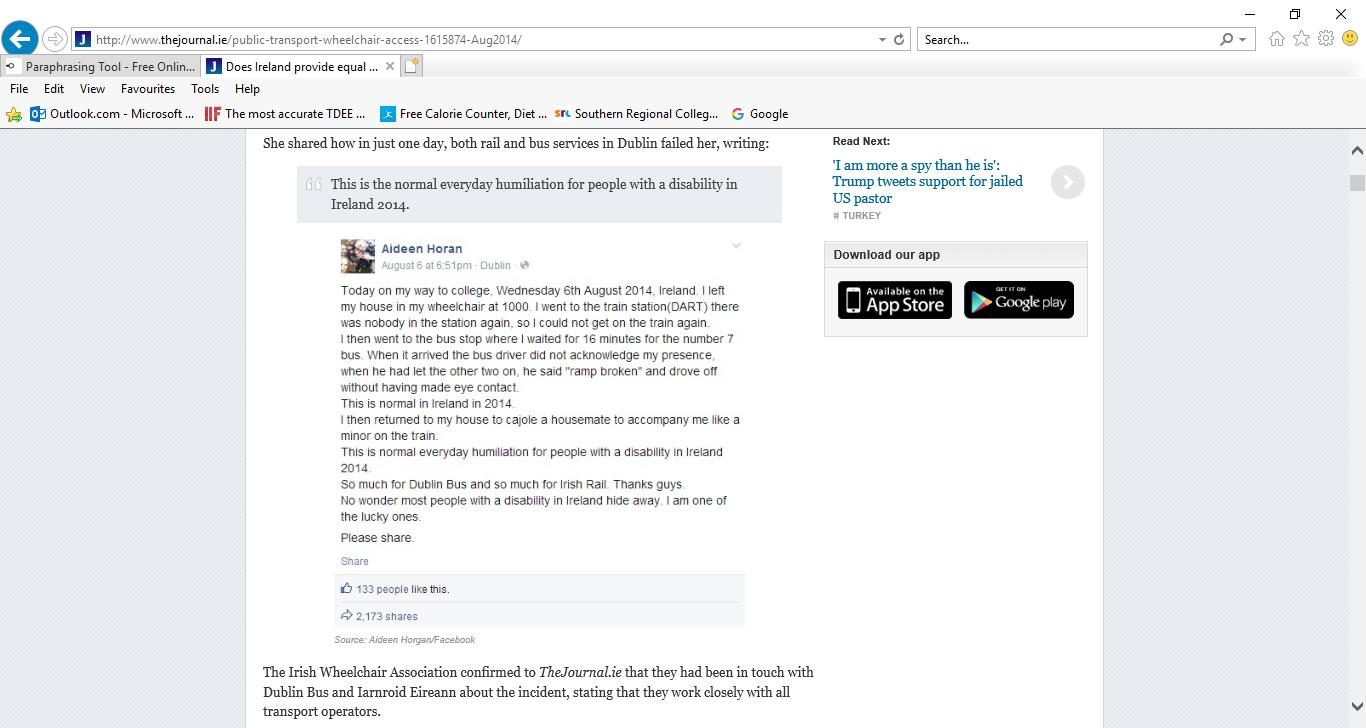Introduction
In this social studies project I will discuss the discrimination / discriminatory towards people with disabilities. This project seeks to investigate / discuss the impact of people with a disability in relation to how they are treated compared to people with no disabilities, this project will include the barriers people face to seek regarding education and employment, and the sports they partake in.
Assignment Prime is an online assignment writing service provider which caters the academic need of students.
Get Best Pricing Quotes Free Samples Email : help@assignmentprime.com Order NowMethodology
Research Design
The study design was in two parts: firstly, a comprehensive international literature review on access and use of mainstream health services and secondly, individual interviews with adults with a disability on their experience of mainstream health services. Individual interviews were chosen as the most appropriate method of data collection to capture service users experiences and to provide a person-focused approach (Priestley, 2000) and a framework within which respondents could express their understanding and experience in their own terms (Patton, 2002).
Data Collection
The study is based on analsying the individual opinion and behaviour towards the research issues in whihc there has been implicatio of varaious methods of gathering this information. It comprises with primary and secondary data collection on which the reseracher had surveyed and interviewed with varaious individuals.
Sampling Method
Thirty-two interviews were carried out of which 27 were directly with people with a range of disabilities (15 men, 12 women; age range, 21 to 77 years, including persons with intellectual, physical and sensory disabilities, people who have suffered brain injury and people with physical who experience mental health difficulty). In addition to people with disabilities the mothers of two men with brain injury were interviewed, as were three advocates of people with moderate to profound levels of intellectual disability.
Ethical Consideration
To have the authenticated and adequate research operations there are various operations which will be helpfuil in examoining the fact. All the relevant authors and literetaure has been properly refrenced. There can be development of various new techniques which in has the impacts over gaianing the adequate study over the research problems. Terefore, the researcher has considered all the legal sources and make fruiftful examinataion of the facts.
Research Limitation
In accordance with this research study there has been consideration of all the resources and people who has presented their frtuitful ideas and thoughts in relation with making the adequate analysis over research obstacles. It has been asceratined here that the individuals did not present their adequate views over such analysis. They did not present theri clear views as the level of conffidence was comparatively lower than expected. The time of conduting the research was also not adequate and appropriate as to meet all the resspondents as well as analysis over all the resources.
Results:
Some of the participants had experienced their disability from birth while others had acquired a disability. Several persons experienced dual or multiple disabilities. Two thirds of the participants reported living in an urban area and more than half reported themselves to be employed although only four participants were in full time open employment with the others working in either part time (2) or in sheltered or supported employment or on training schemes. The majority of those interviewed had a medical card and a few had private health insurance while three persons had neither. The interviewees were identified through voluntary agencies that liased between the interviewee and research team to facilitate communication. All participants reside within one health board area although many had previously and some continued to access health services from other health board areas.
Main Section
A person with a disability can sustainability affect a person’s life from their normal day to day activities and may occur during birth or occur during a person’s lifetime. A person with a disability can be referred to been physical or sensory impairments, it can be a short or long-term illness. A person with a disability cannot be readily identified some of these disabilities are: vision impairment, deaf or hard hearing, mental health conditions, intellectual disability, cystic fibrosis, or physical disability. According to Kelly an O’Donohoe 2014. “there is 27,691 people registered on the National Intellectual Disability in 213”.
Definition of Disabilities:
Impairment: When a person who is impairment disabled this means the person is abnormality in body structure or of a physiological or psychological function.
Activity: A person who is limited in performing activities to function to the best of their ability.
Participation: The person will be limited on day to day participation involvement in life situations in relationship impairments, activities, health conditions contextual factors. Participation is restricted within personal maintenance, mobility, exchange of information, social relationships. education, employment, leisure and spiritually.
A person with a disability who is been unlawfully treated than a person without a disability this can be treated as discrimination. An example of this direct disability discrimination if a restaurant owner refused entry because they are blind and have a guide dog. Another example of disability discrimination if there are no disabled toilets wheelchair users to be used in a shopping Centre. The truth is, disability is not a choice anyone can have it.
When a person is disabled their condition can be a hidden disability, this person could be suffering with severe back pain longer than 12 months which can affect their employment and lifestyle. When a person is to be classified of been disabled they face many barriers in life, they would be on specific medications to help aid their condition, the person might not be able to work again and would have to seek a disability allowance.
Equality- When people are disabled they should be recognized and treated as having equal status with all other citizens.
Participation- A person who is disabled should have the right to participate in Irish life to the fullest content.
Independence- People with disabilities have the right to be able to achieve their full potential, make their own decisions and choices.
What term disability cover
According to the Disability Federation of Ireland 2017 ‘Mainstream health service are often not appropriate and/or accessible to the needs of people with disabilities’. People who are disabled in Ireland struggle to pay for their medication as they are not properly assessed within the medical card system, this can mean that these people are replying on their social welfare payments to pay for their medication while also struggling to pay bills daily. Disabled people reply on social welfare payments as many face barriers trying to access work. In Ireland the disability allowance for a disabled person is E193 per week that might be the only income that person will get weekly and are relying on this as a long-term payment, while a person who is not disabled is getting the same amount of money as a person on a job seekers allowance who might be living at home with their parents rent free. It is recommended for people to get disability insurance, this cover the person for short term insurance between 3 – 6months which could be back pain while the person recovers, this short-term cover will provide an employee 40-60% of the regular wages. If the person suffers a long -term disability like cancer or neurological disorder suddenly not been able to walk or talk the person would require a life long disability insurance cover, the long-term disability insurance provides 50-70% of the regular wages providing the person has chosen the correct disability insurance plan before sustaining the disability.
Apart from reduced opportunities to earn income, the living standards of people with a disability are also affected by costs associated with the disability itself, such as health care, assistance, aids and devices. It is estimated that the long run cost of disability is about one third of an average weekly income. In an American study, two-thirds of disabled participants reported a financial barrier as the main reason for not going to see the doctor. The results suggest that low-income people with disabilities were more likely to experience financial barriers to care (Rosenbach, 1995). This is supported by a national study of 800 people with physical disabilities in the US by Beatty et al., (2003) which found that those reporting the poorest health and the lowest incomes were least likely to receive a comprehensive array of health services. In a UK study, people with disabilities in employment who use community health services such as physiotherapy, occupational therapy and chiropody commented that it was impossible to get an appointment out of office hours (Clark, 2002). Access is becoming less accessible for disabled people to attend health care services, within local GP’s and clinic services the physical environment often impedes access to health care services particularly for people with physical disabilities, for example doors are to narrow for wheelchairs, some physicians’ offices and other heath care facilities are not easily accessible.
Disabled people's voluntary organizations play a huge role at the local, national and international levels for disabled people, governments, service providers and the public. In many cases, the organizations of disabled people are the best vehicle to carry out the aspirations of people with disabilities. After all, disabled people, from their own personal experiences best know their needs, aspirations and abilities. One of the main themes of the World Programme of Action is the importance of Organizations of Disabled Persons. It calls upon governments to encourage their development and utilize their expertise. Special Olympics is an international organisation which provides both sporting and social outlets for individuals with Intellectual Disability. In Ireland, Special Olympics Ireland is the most popular organization or club that individuals of any age group with Intellectual Disabilities attend. Special Olympic is in 172 countries worldwide, it provides opportunities to help fight the intolerance, injustice, inactivity and social isolation faced by the 4.9 million athletes worldwide. Within Ireland Special Olympics has clubs across the country helping people with disabilities to participate in sport and living an active healthy lifestyle. Special Olympics athletes improve their health and fitness by providing them with access and advice on health care at Special Olympics games. Dowling et al 2010 “states Special Olympics has become more than a sporting organization as it works towards supporting people in their overall health and well-being”.
Transport
Public transport is essential for enabling disabled people with disabilities to take part in normal day to day activities, work, leisure, education and social activities. A problem for people with physical disabilities is transport. There is a health and safety issue with the Luas tram in Dublin on how busy it can be during peak hours, when a person has reduced mobility the person at times will have nowhere to sit, or it can be challenging getting on and off the tram. Making the use of health clinics accessible is of little use if you cannot travel to them. Disabled people who have financial issues restrict their ability to own a car rely on public transport to be safe and disabled friendly. Below is an article taken from the Journal.ie website, this is an example of discrimination in Ireland in 2014. A woman on her way to college that required assistance to get onto the train there was nobody there to help her, she then went onto a bus stop when she got there the ramp was broke for her to get on the bus, but the bus was still in operation. The bus driver did not acknowledge her and drove her. As you can see from the post below the woman is furious and say this is common humiliation towards disabled people in 2014.
http://www.thejournal.ie/public-transport-wheelchair-access-1615874-Aug2014/

According to an advocacy group published in the Irish Examiner disabled people are classed as “second class citizens”. Karl Doherty from Donegal took a case against Bus Eireann he is a wheelchair user who was travelling to Dublin for a hospital appointment. he was refused entry onto the bus as the driver did not know how to operate the ramp. Bus Eireann have stated they require 24 hours’ notice given on intention to travel. This is disclination towards disabled people they must give notice to travel and Bus Eireann’s staff not having the knowledge on how to operate a ramp. This can be very humiliating towards any person while everyone should be treated equal.
Housing
The typical housing circumstance of people with disabilities is a concern in Ireland as not many bungalow houses are being built for those who are in a wheelchair or need access to bungalow housing. There is a lack of housing being built with ramps to facilitate people on wheelchairs, physical accessibility is the first and most obvious potential barrier for people with disabilities. In 2014 there was 300,000 disabled people stuck on a housing waiting lists across the UK, they are forced to make do in accommodation that does not meet their needs, these people are living in homes that does not meet all their needs so there is a costly social care package for everything that person can’t do. The people in need of these homes need an easy to adapt lifetime home that are easy accessible according to their lifestyle and disability. It can be challenging for homeless people to find housing with there disability as each person’s disability differs from each other, a person might be deaf or have speech problems. For example, a homeless man is seeking emergency housing from his local authority, the man has Tourette’s syndrome which means he swears a lot, there is a note of this on the estate agents file. When the homeless man comes in for the interview the local authority officer refuses to interview the man as he is swearing a lot. The refusal of the interview for the man would be discrimination as it was connected to his disability. Furthermore, health care staff are often not trained to correctly and safely transfer a patient from a wheelchair onto an examining table.
Conclusion
To examine the opinion and obstacale which were mainly faced by the disable people in the workplace, schools, colleges and in the socila eneviornment the reserch has been conduicted as to have appriopriate detremination of all the facts. Therefore, there are various people which were surving with multiple discrimination that has affected their psychology and living style. Moreoevre, the outcomes derrived from the intereview surveys which demonstrates here that there are lack of confidence among people with disabilities. They were not confidendt among the other people as per prsenting thir opinion and making the effective observations.
References
- https://www.citizensadvice.org.uk/law-and-courts/discrimination/discrimination-because-of-disability/disability-discrimination/#discrimination_when_buying_or_renting
- http://www.specialolympics.ie/Portals/0/public_documents/Volunteers/SOPHIE-Main_Report_final-pdf_18-10-2016.pdf
- https://www.disability-federation.ie/download/pdf/final_dfi_pbs_12_july_2018_short_version.pdf














